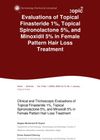New (although questionable) paper: 5% topical spironolactone more effective than 0.1% topical finasteride Research/Science 9/16/2020
A questionable paper which suggests that 5% topical spironolactone is more effective than 0.1% topical finasteride for treating hair loss. It should be taken with a grain of salt due to the journal it was published in.
View this post in the Community →
Similar Community Posts Join
5 / 534 resultscommunity MinoxidilMax now sells Ru55841
MinoxidilMax is now selling a product called Ruderma, which contains RU58841, a chemical used for hair loss treatment. Some users question the legitimacy of the company, while others discuss the standard concentration of RU58841 and mention that both men and women use finasteride for hair loss.
community According to one study, topical spironolactone is more effective than topical finasteride for both men women.
Topical spironolactone is more effective than topical finasteride for treating hair loss in both men and women. Oral spironolactone can affect testosterone, but the topical form doesn't impact the endocrine system.
community Comparison of options: topical vs medication
A user diagnosed with AGA is seeking advice on hair loss treatments, comparing topical Minoxidil, Spironolactone, and Finasteride to oral medications and natural methods like dermastamping, PRP, and LED light. They are concerned about side effects and effectiveness, especially given their existing fatigue.
community Reddit’s amatorial meta analysis of 17 already avaliable hair loss prevention treatments that were found to be effective in clinical studies but are not FDA approved for MPB. PROS and CONS. (2022 Guide if Finasteride and Minoxidil are not working/ give you sides/are not enough) 77 studies linked!
The post and conversation are about hair loss treatments that have been found to be effective in studies. There are 19 different treatments mentioned, including oral minoxidil, oral dutasteride, topical finasteride, RU58841, and more. The best treatment for an individual depends on factors like availability, cost, side effects, and personal preferences.
community Is my routine good enough?
A 29-year-old is experiencing diffuse hair loss and has been using minoxidil without success. They are now trying a routine with oral minoxidil, topical finasteride, and dermarolling, but are unsure about the effectiveness and legitimacy of the products.
Related Research
6 / 1000+ resultsresearch Topical Finasteride Versus Topical Spironolactone in the Treatment of Androgenetic Alopecia
Topical spironolactone works better than topical finasteride for hair loss.

research Antiandrogens and Androgen Inhibitors in Dermatologic Treatments
Antiandrogens and androgen inhibitors like spironolactone, finasteride, and dutasteride can treat hair loss and skin conditions, but they have risks and side effects, including potential harm to pregnant women and risks of cancer and heart issues. Herbal remedies also have antiandrogenic effects but lack safety validation.

research Efficacy of Topical Minoxidil and Oral Spironolactone Versus Minoxidil and Finasteride in Androgenic Alopecia
Both minoxidil-spironolactone and minoxidil-finasteride treatments work for hair loss, but minoxidil-spironolactone is slightly more effective, especially in women.

research Clinical and Trichoscopic Evaluations of Topical Finasteride 1%, Topical Spironolactone 5%, and Minoxidil 5% in Female Pattern Hair Loss Treatment
Topical finasteride is as effective and safe as minoxidil for treating female pattern hair loss.

research Medical Management Options for Hair Loss
The document concluded that FDA-approved treatments like minoxidil and finasteride are effective for hair loss, while the effectiveness of natural remedies and other non-approved treatments is not well-supported by evidence.

research Androgenetic Alopecia: Therapy Update
There are many treatments for common hair loss, but more trials are needed to decide which are best.